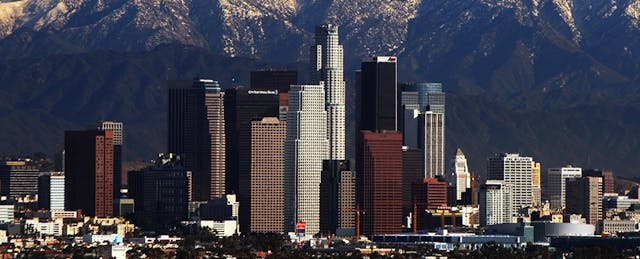No question that public schools in Los Angeles have their challenges. Charter schools in the City of Angels have also been growing in popularity.
Yet news of a 44-page draft memo, leaked to the LA Times and likely penned by the Broad Family Foundation, urges wealthy benefactors to raise $490 million to build out charter schools to support half of LA's students--and is already drawing fire. Worse, the memo echoes themes poignantly portrayed in reporter Dale Russakoff's recent book, The Prize: Who's in Charge of America's Schools.
The LA Times published the full memo here. Dated June 2015 and entitled "The Great Public Schools Now Initiative," the plan critiques traditional public schools: "According to recent College Board data, only 27 percent of Los Angeles seniors met the college readiness benchmark on the SAT, indicating that they would graduate from high school ready for college. Moreover, according to the California Department of Education, 136 schools in LAUSD are in the lowest decile in terms of performance for all schools in the state…”
The plan offers a cheerier pictures of the results of the charter schools: “Los Angeles has the largest population of public charter students of any city in the United States, and the charter sector consistently performs well above its expected benchmarks…” As a result, the paper notes, “As the number of high-performing charter schools has increased, so has parental demand for alternatives to failing district schools. As the following chart shows, 41,830 students are on waiting lists for charter schools within LAUSD.”
But no matter how sincere the intentions, there are eerie echoes with another plan that went awry.
The report describes how Los Angeles could become a bellwether for the nation:
"Los Angeles is uniquely positioned to create the largest, highest-performing charter sector in the nation. Such an exemplar would serve as a model for all large cities to follow."
Yet Russakoff's book observes that when Newark's champions sought to make it a "national proof point" for education reform, they lost focus on the needs of the community.
Worst of all: None of the reformers really listened to the community. Russakoff writes:
"For four years, the reformers never really tried to have a conversation with the people of Newark....The was less focus on Newark as its own complex ecosystem that reformers needed to understand before trying to save it. Two hundred million dollars and almost five year later, there was at least as much rancor as reform."
Howard Fuller, former superintendent in Milwaukee and one of the first prominent African American education reformers, shared his regrets with Russakoff. "'It's not even what you do sometimes, it's the way you treat people in the process of doing it. If your approach is to get a lot of smart people in the room and figure out what 'these people' need and then we implement it, the first issue is who decided that you were smart? And why do you think you can just get in a room and make decisions for a community of people?'"
The Los Angeles plan seems to be headed down a similar path, with an advocacy and public relations program that is expected to be significantly heftier than, say, expenditures for training principals:


Russakoff's book is not harsh on charters. Indeed, one of the true heroines of the book, a teacher named Princess Fils Aime, eventually leaves her job at a traditional school to teach in a charter. At the charter, Aime has more resources to help support students, even though the actual funding per child was lower than in the traditional schools. Aime concluded, Russakoff writes, "...not that charters were inherently better, but rather that they were structured to more easily deliver money to classrooms than was the district."
The call at the conclusion of The Prize should resonate in Los Angeles as it did in Newark: to put aside ideological divisiveness and center the national conversation around education reform squarely on the real needs of children.


